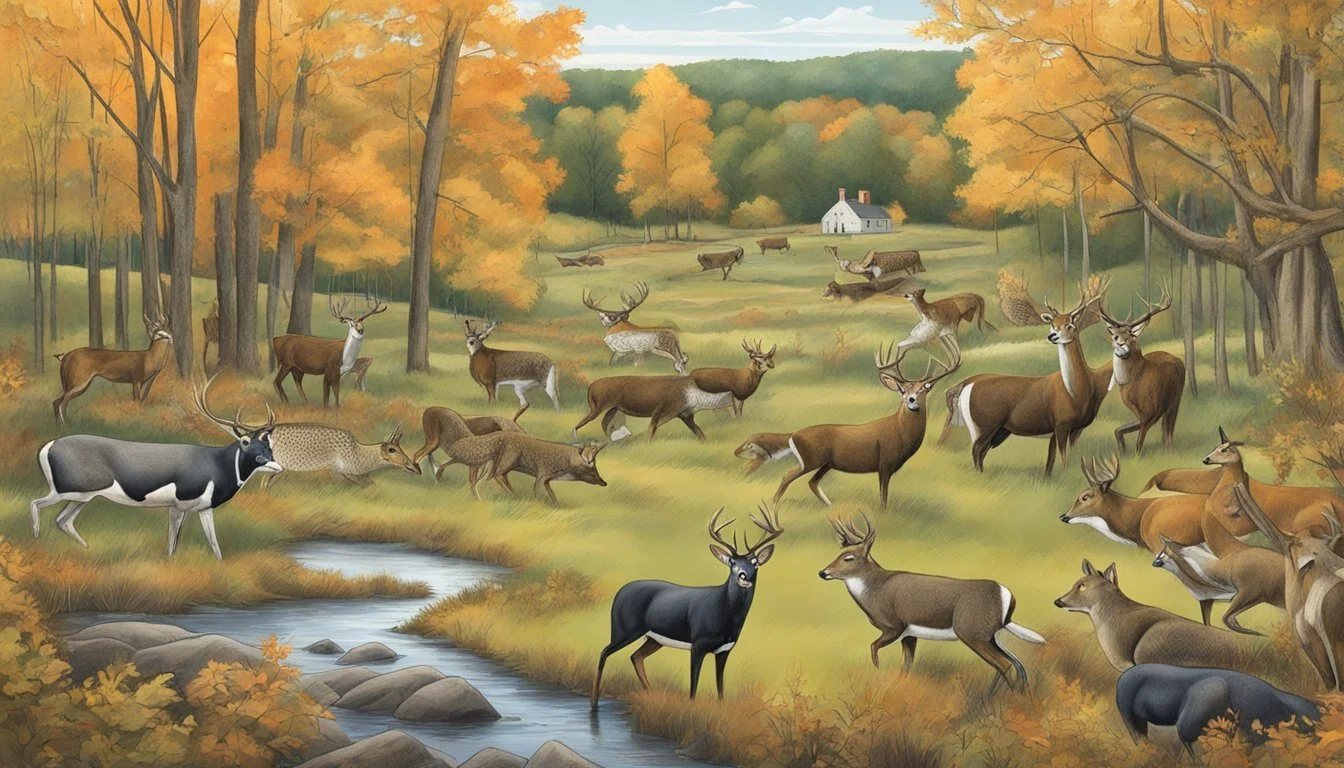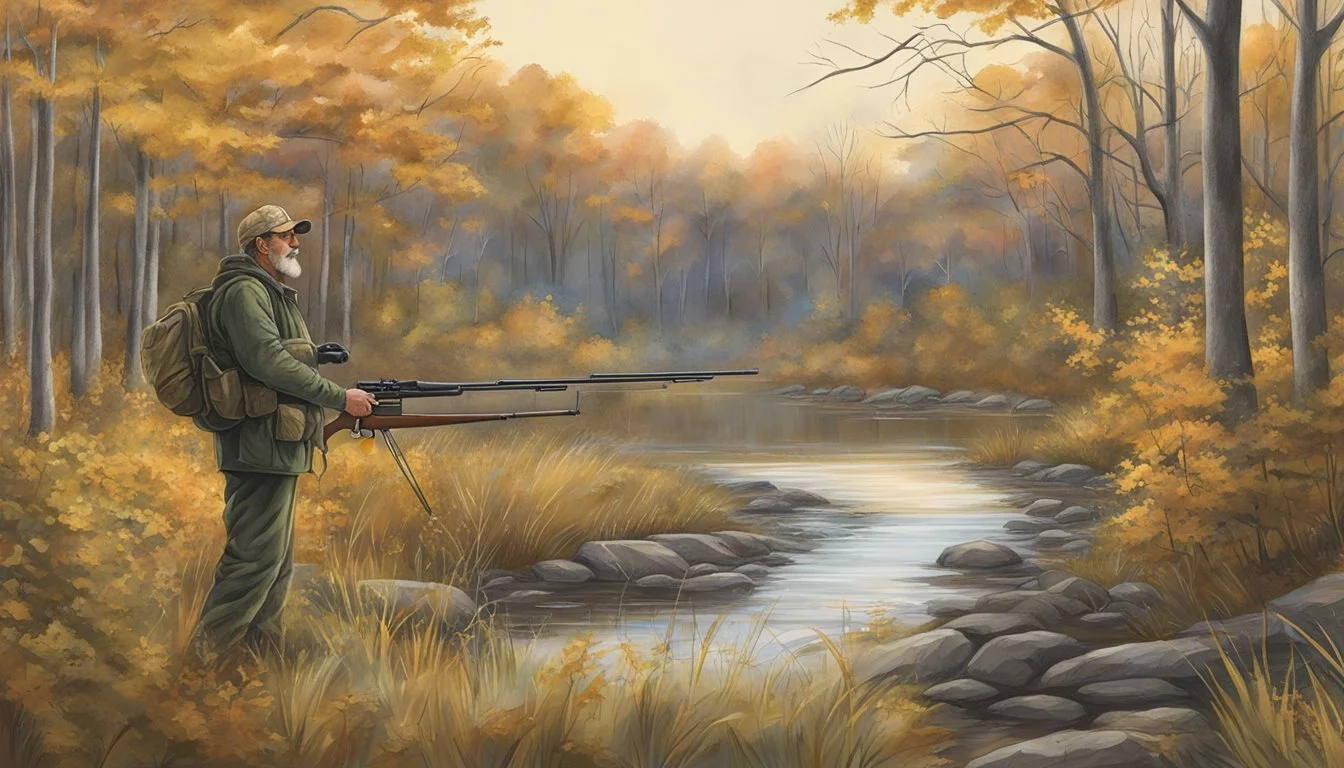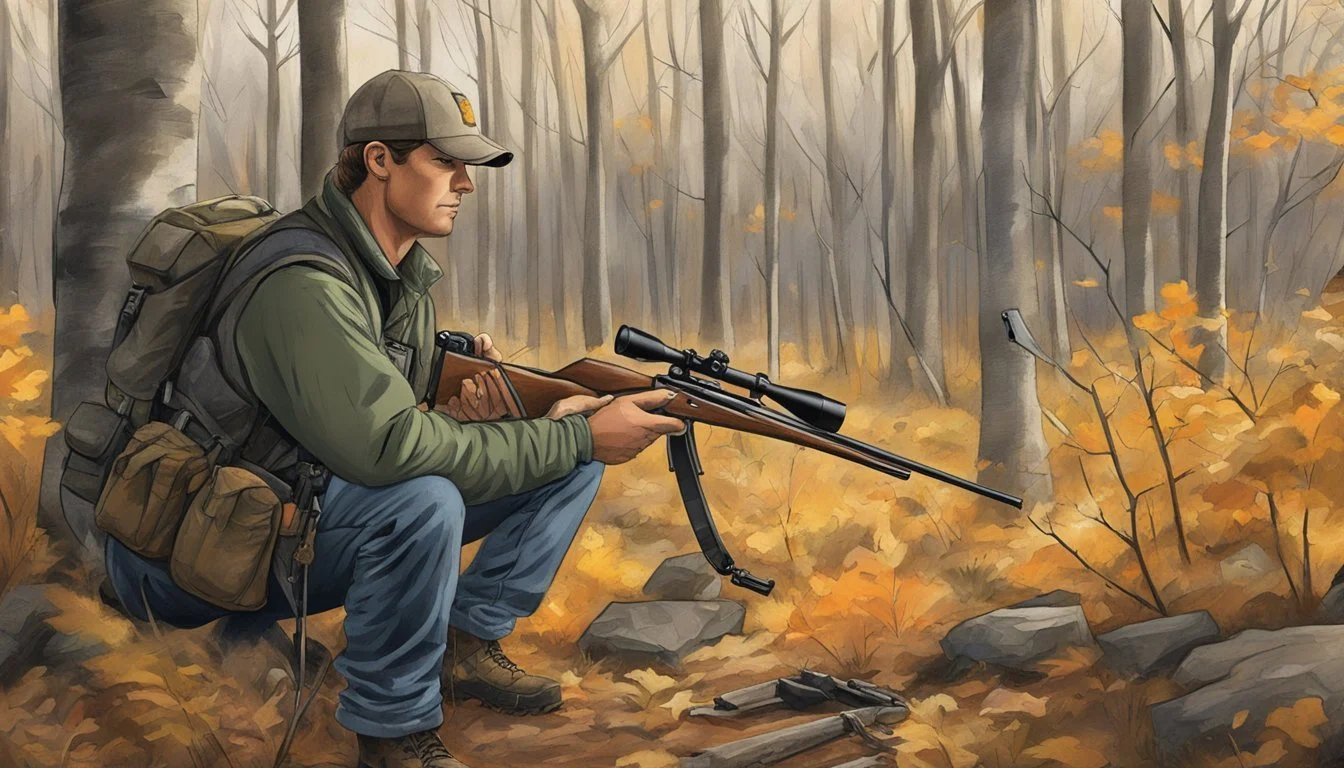Hunting Leases Connecticut
Your Guide to Prime Locations and Regulations
In Connecticut, despite its modest size compared to other states, the opportunities for hunting are myriad and appealing. With a diverse range of habitats, the state provides hunters with the chance to engage in both large and small game hunting. Connecticut maintains a balance between its urban areas and wildlife management zones, allowing for managed hunting leases that help control certain species populations and provide recreational activities for hunting enthusiasts.
Hunting leases in Connecticut offer a structured and legal means for hunters to access private lands where they can pursue game such as whitetail deer and various small game and furbearers. These leases can range from short-term day permissions to longer seasonal contracts, depending on the landowner's preferences and the hunter’s needs. The leases are crucial in helping to curb overpopulation of game species, thereby supporting ecological balance and contributing to conservation efforts within the state.
For hunters looking to secure a spot for their next hunting venture, numerous online resources detail the availability of private hunting lands. These websites often catalogue properties by location, type of game available, and price, making it straightforward for hunters to find a lease that aligns with their objectives. Connecticut's managed hunting lands through leases strengthen the bond between landowners, hunters, and wildlife management, ensuring that hunting traditions continue to thrive within the legal and ethical guidelines set forth by the state.
Understanding Hunting Leases in Connecticut
In the context of Connecticut, hunting leases are agreements that grant individual hunters or groups the right to hunt on private land. These leases provide structured access to hunting grounds in a state where public land may be limited.
What Is a Hunting Lease?
A hunting lease is a legally binding contract between a landowner and a hunter or a group of hunters, allowing them access to the private land for hunting purposes. In Connecticut, these leases typically stipulate the types of game that may be hunted, the duration of the lease, and specific land use practices to ensure safety and conservation efforts.
Benefits of Leasing Hunting Land
Increased Access: Leasing private land in Connecticut provides hunters with more opportunities to hunt in areas that may not be as crowded as public lands.
Tailored Hunting Experience: Hunters can negotiate terms that fit their specific needs, such as the types of game and the methods of hunting allowed.
Conservation: By entering a lease, both parties can agree on ethical land management practices that promote wildlife sustainability.
Income for Landowners: Landowners in Connecticut can generate revenue from their otherwise unused land by establishing hunting leases.
Types of Hunting Available
Connecticut offers a diverse range of hunting opportunities for various species, catering to the preferences of both local and visiting hunters. The state provides dedicated seasons and designated lands for each hunting type, promoting sustainable wildlife management and outdoor recreation.
Deer Hunting
Deer hunting is a significant draw in Connecticut, focusing predominantly on the abundant whitetail deer. Hunters can find private leases that offer both archery and firearms seasons. The state's management programs ensure a robust deer population, making it a desirable destination for those seeking to harvest a trophy buck or secure venison (What wine goes well with venison?) for their table.
Small Game Hunting
For enthusiasts of small game hunting, Connecticut's habitats support a variety of species such as squirrels, rabbits, and hares. This type of hunting requires precision and patience, and hunters can pursue their quarry in multiple terrains, from hardwood forests to brushy fields.
Waterfowl Hunting
Waterfowl hunting in Connecticut attracts hunters to its lakes, rivers, and coastal areas. Common targets include ducks and geese, with specific zones and bag limits set to maintain healthy waterfowl populations. Successful hunts hinge on understanding migratory patterns and habitat preferences.
Upland Bird Hunting
Upland bird hunting is a cherished tradition, with hunters seeking game birds like pheasants, quail (What wine goes well with quail?), and grouse. Hunting these birds often involves walking through diverse landscapes and the assistance of well-trained hunting dogs to flush and retrieve.
Furbearer Hunting
Furbearer hunting focuses on species such as foxes, coyotes, and raccoons. This type of hunting not only provides a challenging pursuit but also plays a role in controlling populations that could otherwise impact local ecology and property.
Turkey Hunting
Spring and fall seasons make turkey hunting a popular activity in Connecticut. A mixture of open fields and wooded areas offer ideal turkey habitats. Hunters often use calling techniques and strategic positioning to attract these elusive birds during legal hunting hours.
Hunters in Connecticut are responsible for following all regulations, obtaining appropriate licenses, and respecting both the wildlife and the rights of property owners on leased hunting lands.
Finding and Acquiring Hunting Leases
Securing the right hunting lease requires knowing where to look, understanding how pricing works, and being aware of the lease terms. A systematic approach helps hunters save time and increases their chances of finding the optimal hunting ground.
Where to Search for Hunting Leases
Hunters seeking leases in Connecticut can begin by exploring platforms like HuntingLocator.com and HLRBO (Hunt Lease Network), which offer listings for various available properties. Detailed search tools on these sites allow users to save searches and sort by different criteria, including acreage range. Local hunting groups, online forums, and hunting associations often have classified sections and discussions focused on leasing opportunities.
Comparing Lease Pricing
When reviewing hunting leases, it's essential to compare the lease pricing. This can vary widely based on factors such as location, size, and available game. Results on sites like HLRBO show different properties, enabling hunters to easily compare costs. Some platforms may also offer a bidding system, which can affect the final lease price.
Understanding Lease Terms
The lease term is a critical factor in the decision-making process and can range from short-term seasonal leases to multi-year agreements. Hunters should carefully examine the terms, identifying any restrictions, responsibilities, and provisions for lease renewal. Knowledge of lease specifics ensures clear expectations and can prevent future misunderstandings between the hunter and the landowner.
Connecticut Hunting Regulations
In Connecticut, diverse hunting regulations ensure the safety and conservation of wildlife. These rules encompass general statewide regulations, licensing requirements, and specific provisions governing hunting leases.
General Statewide Hunting Regulations
Connecticut enforces specific statewide hunting regulations to maintain wildlife populations and ensure hunter safety. One regulation prohibits hunting on Sunday, with the exception of private shooting preserves and certain archery deer hunting on private land. Furthermore, using a motor vehicle for hunting is restricted under Section 26-74 of the state’s hunting statutes. Additionally, there are specific regulations for the taking of migratory birds, and a violation can occur for hunting before or after the legal hunting hours as designated by the state.
Hunting License Requirements
All hunters in Connecticut must possess a valid hunting license. The state mandates that individuals meet a minimum age requirement before they are allowed to apply for a hunting license. Prospective hunters also need to complete a hunter education course as part of the licensing process. For migratory bird hunting, changes to HIP permits must be observed especially when purchased through third-party license vendors.
Lease-Specific Rules and Regulations
Each hunting lease in Connecticut may have its own set of rules and regulations that complement the general statewide hunting laws. Landowners and lease operators often enforce these to address particular concerns of the property such as specific game management strategies, designated hunting areas within the property, and safety measures particular to the terrain. Hunters are required to familiarize themselves with and abide by these lease-specific provisions to ensure compliance and maintain good standing with the lease agreement.
Preparation and Safety
When considering hunting leases in Connecticut, preparation and efficient safety measures are paramount. The hunter's gear must include proper attire and compliance with property rules is non-negotiable to ensure a secure and lawful hunting experience.
Essential Safety Gear
The foremost consideration for any hunter is to be visible to others while remaining unseen by game. Here is a list of essential safety gear:
Proper Hunting Orange: A minimum of 400 square inches of fluorescent orange (hat and vest) is required during the firearms hunting season.
First Aid Kit: Every hunter should carry a basic first aid kit for unexpected injuries.
Property Boundaries and Access
Understanding the layout and access points of the hunting property prevents trespassing and ensures the safety of the hunter and others.
Fences and Gates: Familiarize oneself with the location and purpose of fences and gates to respect property lines and the movement of wildlife.
Security: Respect the security measures put in place, which may include locks on gates or restrictions to certain areas to maintain the integrity of the property and safety.
Amenities and Accommodations on Hunting Leases
Hunting leases in Connecticut offer various amenities to enhance the hunting experience, providing essential comfort and accessibility for all hunters, including those with physical disabilities.
Facilities for Hunters
Connecticut hunting leases are equipped with a range of facilities designed for the convenience of hunters. They typically include:
Restrooms/Toilets: Clean and well-maintained sanitation facilities are available, ensuring that basic hygiene can be comfortably managed during hunting excursions.
Fresh Drinking Water: Access to potable fresh water is a standard provision, easing the need to carry large quantities from home.
Camp Grounds: Many leases offer campgrounds for overnight stays, ranging from basic clearings suitable for tent pitching to more structured sites with fire pits and seating areas.
These facilities are intended to cater to the hunter's need for basic comfort, enabling them to focus on the hunting experience.
Access and Provisions for Physically Disabled Hunters
Hunting leases in Connecticut actively work to accommodate hunters with physical disabilities. Amenities specific to such needs may include:
Adapted Restrooms: Facilities equipped with wheelchair access and support rails.
Accessible Hunting Blinds: Strategically positioned to provide ample opportunities for hunting without the need for extensive mobility.
Well-Maintained Paths: Trails and paths are maintained to allow for easier movement across the terrain.
The inclusion of these features demonstrates a commitment to ensuring that hunting activities are inclusive and accessible to all interested participants.
Recreational Opportunities Beyond Hunting
In addition to hunting, Connecticut offers a variety of outdoor activities that cater to nature enthusiasts and adventure seekers. These activities take advantage of the state's rich natural landscapes and provide visitors with year-round recreational options.
Horseback Riding and Hiking Trails
Connecticut boasts an extensive network of trails that provide an escape for both horseback riding and hiking. The trails wind through scenic forests and parks, giving visitors a chance to experience the state's natural beauty.
Horseback Riding: Equestrians can find designated trails in state forests, which are often well-marked and maintained for safety and enjoyment.
Hiking: Various hiking paths range from easy walks to challenging treks, catering to different skill levels and providing opportunities to witness local wildlife.
Fishing and Wildlife Viewing
Water bodies across Connecticut not only support abundant fishing opportunities but also make for excellent wildlife viewing locales.
Fishing: Anglers can find freshwater and saltwater spots teeming with a variety of fish species, including trout and bass.
Wildlife Viewing: Nature reserves and wetlands are ideal for observing birds, deer, and other fauna in their habitat, contributing to the state's ecotourism.
Winter Sports Considerations
When the temperature drops, Connecticut transforms offering winter sports activities such as skiing.
Skiing: Enthusiasts can take to the slopes at local ski resorts, which provide runs for all skill levels and often include additional features like snowboarding areas.
Trails: Outside of organized resorts, many of the state's trails are suitable for cross-country skiing and snowshoeing, offering a quieter encounter with the winter landscape.
Hunting Lease Management and Practices
Hunting leases in Connecticut involve the rental of private land to hunters, requiring effective management and ethical practices to ensure sustainable use and conservation of wildlife.
Working with Landowners
Landowners in Connecticut play a crucial role in hunting lease management. They set the terms of the lease, which can range from short-term agreements to annual contracts. Landowners determine the hunting types allowed, the acreage available, and the lease term conditions. It’s essential that landowners communicate clearly their expectations and rules regarding the land use to maintain the integrity of the property and uphold safety standards.
Responsibilities of Landowners:
Ensure safe hunting conditions
Set clear hunting restrictions
Manage hunter access to the property
Wildlife Management and Conservation
Wildlife management is integral to hunting lease practices in Connecticut. Landowners and hunters must collaborate to promote healthy ecosystems and wildlife populations. Hunting leases can contribute to wildlife conservation by regulating game hunting and protecting certain species during their breeding seasons. Effective practices include:
Sustainable Hunting Practices:
Adherence to game laws and seasons
Harvest quotas based on wildlife population studies
Habitat Improvement Efforts:
Food plots
Water sources
Cover establishment
Public Versus Private Land Stewardship
Stewardship of hunting lands in Connecticut varies significantly between public and private land. Public land is managed by government agencies and often has more strict regulations to ensure the conservation for the public's benefit. Conversely, private land management is the responsibility of individual landowners, who have more flexibility but also a personal interest in maintaining the land's value and ecological health. The benefits and limitations include:
Public Land:
Broader access for the public
Stricter conservation regulations
Private Land:
Flexible management tailored to the landowner's objectives
Potential for additional income through leasing
Lease Culture and Community
Hunting leases in Connecticut contribute significantly to the local economy and serve as prominent social gatherings, strengthening community bonds through shared outdoor activities.
Role of Hunting in Local Economy
In Connecticut, hunting leases are not merely parcels of land allocated for hunting; they play a vital role in shaping the economic condition of local areas. These leases generate income through the lease payments themselves, which often contribute to the maintenance and conservation of wildlife habitats. Additionally, hunters spend on related expenditures such as gear, guides, and local accommodations.
Economic Impact:
Lease Payments: Infuse funds directly into landowner revenues and wildlife management.
Related Expenditures: Hunters' spending supports local businesses including sporting goods stores and lodging.
Hunting as a Social Activity
Hunting, while an outdoor activity, transcends into a social tradition in Connecticut, fostering connections among individuals with common interests. Through hunting clubs and the interactions on leased lands, people gather to share experiences, techniques, and stories, reinforcing hunting as a deeply rooted social activity.
Social Features:
Clubs and Organizations: Provide structured settings for sharing hunting traditions and conservation efforts.
Social Gatherings: Hunts often culminate in communal meals or game-sharing events, promoting camaraderie.
Policies on Pets and Camp Behavior
In Connecticut, hunting leases necessitate strict adherence to rules regarding pets, specifically dogs, and the prohibition of alcohol and drugs to ensure safety and compliance with state regulations.
Dogs and Hunting
Leashing: Dogs employed in hunting activities should be kept leashed unless actively retrieving game or as permitted by law.
Vaccination Requirements: Hunters must carry valid vaccination slips for their dogs, proving that all necessary shots are up to date to protect both the pet and wildlife.
Alcohol and Substance Policies
Alcoholic Drinks: The consumption of alcoholic drinks is strictly forbidden on hunting leases to maintain a safe hunting environment.
Drug Use: The use of drugs, both recreational and those that impair judgment, is prohibited, ensuring that hunters remain alert and maintain safe practices at all times.
Notifications and Alerts
Staying informed about hunting lease opportunities and environmental conditions ensures a secure and successful hunting experience in Connecticut. Hunters can subscribe to notification services for real-time updates regarding lease availability as well as weather and environmental changes.
Lease Availability Updates
Available Soon: Hunters looking for leases can sign up for alert programs, such as the Deal Alert service mentioned in the provided search results, which notify them as soon as a property that fits their criteria becomes available.
Not currently available: When desired leases aren't currently on the market, these notifications can be invaluable for securing a lease when they do become available.
Weather and Environmental Notices
Weather Update: Connecticut's varied weather patterns necessitate real-time weather updates, which are crucial for planning safe hunting trips. Services offer notifications for severe weather conditions, such as the cold weather protocol activation by the Governor mentioned during a cold snap in January 2024.
Secure Environment: Environmental notices help to maintain a secure environment by informing hunters of any weather-related safety concerns or restrictions that may affect their hunting activities.
Supplementary Information on Hunting in Connecticut
Connecticut’s diverse ecosystems provide a unique hunting experience. The state manages a robust system of regulations and educational resources designed to maintain healthy wildlife populations and habitats.
Notable Game Species and Habitats
Deer: Found across Connecticut with high populations in forested areas, offering popular hunting opportunities.
Turkey: Common in both spring and fall seasons, with areas of secondary growth and open fields being their habitats.
Black Bear: Present in the state, though hunting is currently not permitted.
Furbearer Hunting: Includes species like coyote, which are often found in open, brushy, and forest edge habitats.
Upland Bird Hunting: Targets species such as pheasants, which are found in grasslands and agricultural areas.
Hunters in Connecticut should note that while moose and elk once roamed the state, they are not currently considered game species and hunting them is not permitted.
Educational Resources and Hunting Events
Hunter and Trapper Education Program: Provides necessary courses for those new to the sport.
Hunting Roadmap: Offers guidance on how to start hunting, including information on seasons and permitting.
Events such as archery workshops and youth hunting camps are also organized to instill safe and responsible hunting practices.
While Connecticut may not boast the expansive territories of other states, it strategically manages its natural resources, providing significant opportunities for hunters to engage with a variety of game.










